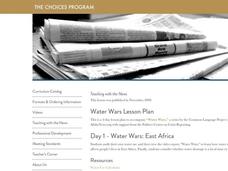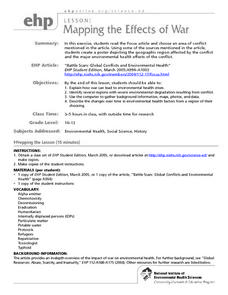Pulitzer Center
Exploring Downstream: Water Resources
The lack of clean water is a life-threatening plight for millions of people around the world. Through an extensive WebQuest, young environment or social studies classes compare our water availability to that of the cxitizens of Ethiopia,...
Curated OER
Scarcity of Water Throughout the World
Students identify the various forms of fresh water on the earth. They observe a demonstration aand read articles that show them the importance of water conservation. They write a journal about their opinion regarding paying for water.
Curated OER
Water Wars
Students investigate the water wars taking place in East Africa. In this global issues lesson plan, students watch video clips and read selected articles about the water shortages in East Africa. Students estimate their own average daily...
Curated OER
Rachel's Life is in a Hole
Explore how lack of access to water impacts peoples' lives in poor countries. Through text reading and discussion, middle schoolers are presented with the story of a young girl who lives and functions with limited water resources. They...
Curated OER
Water, Water, Everywhere (High School)
Students view different types of water to make the point that salt or polluted water isn't useful for drinking water. They chart causes, consequences and solutions to water scarcity based on internet research. They write an essay as...
Curated OER
Where Does the Water Go?
Students identify how the geography of the island of Maui influences the sources of water, identify/categorize the users of water on Maui after reading a series of news articles and construct a map of Maui displaying their findings.
Curated OER
Mapping the Effects of War
Students examine how war can lead to environmental health crises. They read an article, conduct research on a region from the article, and create a poster to depict the geographic region and the environmental health effects of the conflict.








